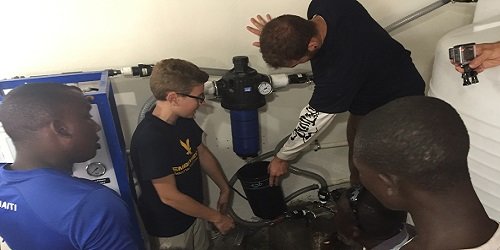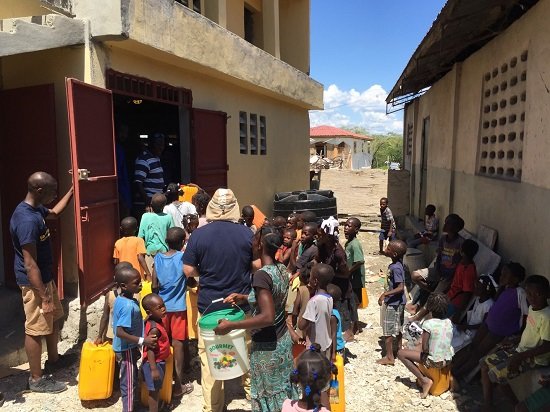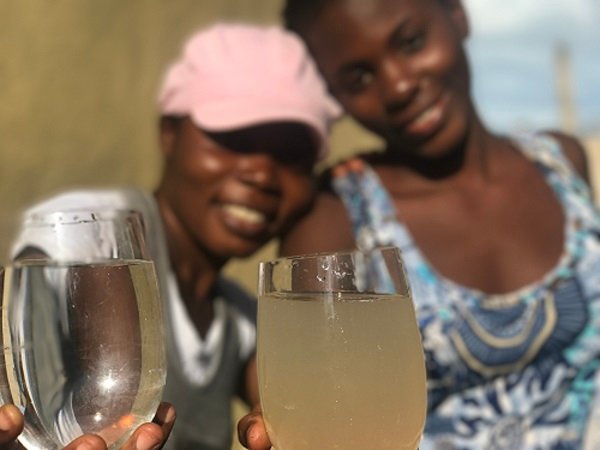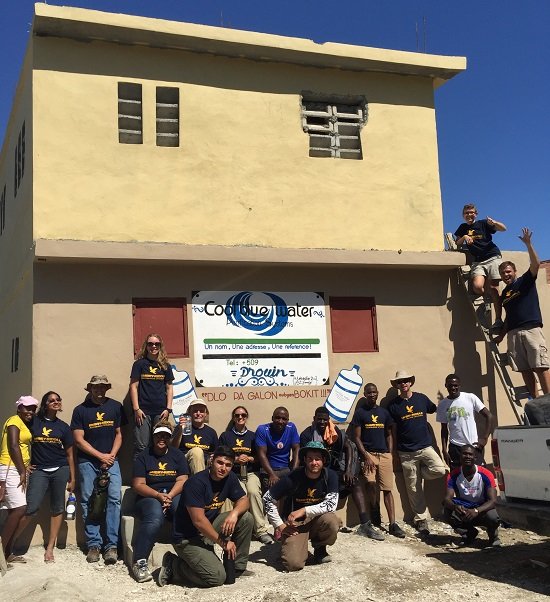 Daytona Beach, FL
Daytona Beach, FL - A group of students from Embry-Riddle Aeronautical University (E-RU) in Daytona Beach built a new solar-powered water purification system in a small community in Haiti, where the main water source was contaminated with raw sewage and the cholera bacteria.
A total of 11 students, associate professor Dr. Marc Compere, and Dr. Geoffrey Kain, professor and director of Embry-Riddle’s Honors Program, traveled to the community of Drouin, Haiti this past summer. The group conducted water quality tests and began building the purifier system in May and then made a follow-up trip in August 2017.
This was the eighth year in a row where students from the university built purifier systems in Haiti. The first project began in 2010 following an earthquake and an outbreak of cholera in Chambrun, Haiti. This year, ER-U partnered with World Renewal International in Haiti, who also has a long-term U.S. partner, Brandywine Community Church in Indiana, which helps to maintain the water purifier.
This year's project included two 500-gallon tanks, the construction of an off-grid purification system and a hurricane-proof solar power system for the well, and a purifier which operates entirely from solar power. The purification system, which is able to remove bacteria, viruses and salts, uses Helix disc filters from a local sponsor, Miller-Leaman Inc. in Daytona Beach.

“It’s one thing to see images on TV of people suffering through poverty and another thing to see it in person,” Mechanical Engineering major Rachel Hunt says. “Haiti is a beautiful and vibrant country full of resilient and resourceful people. Their generosity and gratitude, in spite of their circumstances, taught me just how much I have to offer.”
The community of Drouin, where this year's project took place, has no electricity, plumbing, sanitation, or apparent government services of any kind. Students said that they were shocked at how contaminated the water had been and the response that they got from the people in that community. Jon Prine, a senior Mechanical Engineering student and mechanical team lead for the project, called the water "the dirtiest water we’ve seen throughout the eight years."
Students say the people of Drouin rushed at the opportunity to receive clean water. “It was so emotional. I was crying. Most of us were crying,” Joe Noto, an Aerospace Engineering master’s student and president of Project Haiti 2017, says. “They knew what they wanted, but they couldn’t get to it. We were able to provide that. It’s so powerful. It’s life changing.”

The purified water was labeled on containers by the village as “Cool Blue Water,” clear and free of contaminants. The team also educated school children in the community about why the water makes them sick and how to protect themselves overall from germs. They also distributed wash cloths, toothbrushes, toothpaste, and sanitizer.
The team trained the community on how to maintain an operate the system. They also helped the Haiti partners establish a micro-business to keep the system operational and to help pay for teacher salaries in the village. The rural location is so impoverished that there is no money locally to pay teachers, so the new water business improves education in the community, according to Compere.
“What we brought home was hands-on experience in solving real-world issues with real people and real constraints, and a global perspective and greater appreciation for the life we live here in the United States,” Compere explains.
Students involved in the 2017 project were Calli Brown, Felina Chotoo, Noah Driggers, Audrey Hallam, Rachel Hunt, Zahra Khan, Fevens Louis-Jean, Joe Noto, Dynamite Obinna, Jon Prine, and Daniel Tellez.

NOTE: In top featured photo, Embry-Riddle Aeronautical University students Rachel Hunt, left, and Jon Prine, demonstrate to people in Drouin how to clean the filters for the water purification system.
All photos courtesy Embry-Riddle University.
Copyright Southern Stone Communications 2017.
 Daytona Beach, FL - A group of students from Embry-Riddle Aeronautical University (E-RU) in Daytona Beach built a new solar-powered water purification system in a small community in Haiti, where the main water source was contaminated with raw sewage and the cholera bacteria.
A total of 11 students, associate professor Dr. Marc Compere, and Dr. Geoffrey Kain, professor and director of Embry-Riddle’s Honors Program, traveled to the community of Drouin, Haiti this past summer. The group conducted water quality tests and began building the purifier system in May and then made a follow-up trip in August 2017.
This was the eighth year in a row where students from the university built purifier systems in Haiti. The first project began in 2010 following an earthquake and an outbreak of cholera in Chambrun, Haiti. This year, ER-U partnered with World Renewal International in Haiti, who also has a long-term U.S. partner, Brandywine Community Church in Indiana, which helps to maintain the water purifier.
This year's project included two 500-gallon tanks, the construction of an off-grid purification system and a hurricane-proof solar power system for the well, and a purifier which operates entirely from solar power. The purification system, which is able to remove bacteria, viruses and salts, uses Helix disc filters from a local sponsor, Miller-Leaman Inc. in Daytona Beach.
Daytona Beach, FL - A group of students from Embry-Riddle Aeronautical University (E-RU) in Daytona Beach built a new solar-powered water purification system in a small community in Haiti, where the main water source was contaminated with raw sewage and the cholera bacteria.
A total of 11 students, associate professor Dr. Marc Compere, and Dr. Geoffrey Kain, professor and director of Embry-Riddle’s Honors Program, traveled to the community of Drouin, Haiti this past summer. The group conducted water quality tests and began building the purifier system in May and then made a follow-up trip in August 2017.
This was the eighth year in a row where students from the university built purifier systems in Haiti. The first project began in 2010 following an earthquake and an outbreak of cholera in Chambrun, Haiti. This year, ER-U partnered with World Renewal International in Haiti, who also has a long-term U.S. partner, Brandywine Community Church in Indiana, which helps to maintain the water purifier.
This year's project included two 500-gallon tanks, the construction of an off-grid purification system and a hurricane-proof solar power system for the well, and a purifier which operates entirely from solar power. The purification system, which is able to remove bacteria, viruses and salts, uses Helix disc filters from a local sponsor, Miller-Leaman Inc. in Daytona Beach.


